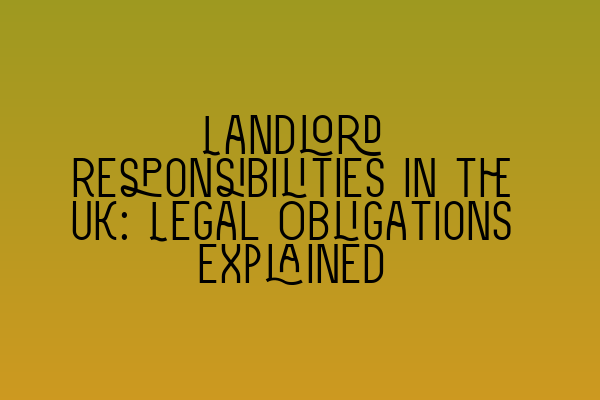Landlord Responsibilities in the UK: Legal Obligations Explained
Being a landlord in the UK comes with numerous legal obligations and responsibilities. Whether you are a seasoned property investor or just starting out in the rental market, understanding these obligations is essential to ensure compliance with the law and maintain a professional and hassle-free landlord-tenant relationship.
In this article, we will explore the key landlord responsibilities in the UK and provide a comprehensive overview of the legal obligations you must adhere to as a landlord. Let’s dive in.
Renting Out Safe and Healthy Property
One of the primary responsibilities of a landlord is to ensure that the rented property is safe and healthy for the tenants to live in. This means complying with all relevant health and safety regulations, such as:
- Providing a property free from hazards and dangers
- Ensuring gas and electrical installations are safe and regularly inspected
- Maintaining proper fire safety measures, including smoke alarms and fire extinguishers
- Keeping the property in a good state of repair
By fulfilling these obligations, landlords can ensure the well-being and safety of their tenants, and avoid potential legal consequences.
Protecting Tenant Deposits
Another crucial responsibility of a landlord in the UK is to protect any tenant deposits received. Under the Tenancy Deposit Protection scheme, landlords must register the deposit with an approved deposit protection scheme within 30 days of receiving it.
This scheme ensures that tenants’ deposits are held securely and can be reclaimed at the end of the tenancy, provided there are no damages or outstanding rent.
Providing the Correct Documentation
When entering into a tenancy agreement, landlords must provide the tenants with certain documents, including:
- EPC (Energy Performance Certificate)
- Gas Safety Certificate (if applicable)
- How to Rent guide
These documents provide important information to tenants and help ensure their rights and safety as occupants of the property. Failure to provide the correct documentation can have legal implications and may invalidate any possession claims.
Maintaining and Repairing the Property
Keeping the rental property in good repair and satisfactory condition is a key responsibility of landlords. This includes timely repairs of structural issues, plumbing and heating systems, electrical installations, and any other essential elements that affect the comfort and habitability of the property.
By promptly addressing maintenance and repair issues, landlords can prevent potentially costly damages and maintain a positive relationship with their tenants. Regular property inspections can also help identify any necessary repairs or maintenance that may be needed.
Respecting Tenant’s Privacy
While landlords have the right to access the property for specific reasons, such as repairs or inspections, they must respect the tenant’s right to privacy. Landlords should provide reasonable notice (usually 24 hours) to tenants before entering the property, unless in cases of emergency.
Respecting privacy is not only a legal obligation but also crucial for maintaining a good landlord-tenant relationship built on trust and respect.
Ending a Tenancy Correctly
When it comes to ending a tenancy, landlords must follow the correct legal procedures. This includes providing the tenant with proper notice period based on the type of tenancy agreement and adhering to the eviction process if necessary. Failure to follow the correct procedures can result in legal repercussions and delays in regaining possession of the property.
Understanding and fulfilling your responsibilities as a landlord is essential for a successful and legally compliant tenancy. By doing so, you can protect both your interests as a landlord and ensure a positive experience for your tenants.
For more information on landlord responsibilities and legal obligations, you may find the following articles helpful:
- Understanding Contractual Capacity: Rights and Limitations
- Interactive SQE Mock Tests for Contract Law: Test Your Knowledge
- Join Our SQE Contract Law Webinars: Expert Insights and Guidance
- Contract Law Reforms: An Analysis of Recent Changes
- Parties in a Contract: Rights and Responsibilities
At SQE Property Law & Land Law, we are committed to helping landlords and property investors navigate the complex legal landscape. Contact us today for expert advice and assistance with your property law matters.
Disclaimer: The information provided in this article is for informational purposes only and should not be construed as legal advice. For professional advice and guidance tailored to your specific situation, please consult with a qualified solicitor.
